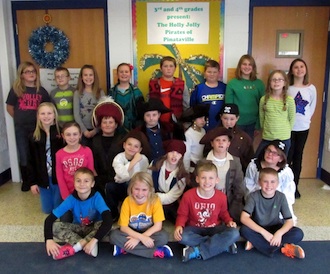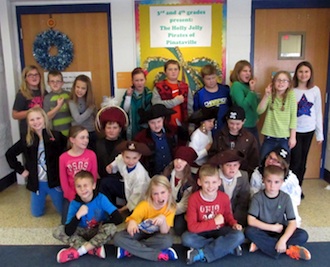Pirates of Pinataville sail in on Dec. 11

The 3rd and 4th graders at Lincolnview will present the holiday musical “The Holly Jolly Pirates of Pinataville” Thursday, Dec. 11 at 7 p.m. in the elementary gym under the direction of Jennifer Slusher.
Pirates have stolen the pinatas the people of Pinataville were making in preparation for Christmas. What will they do? Please join us this evening to find out.
We live in a world surrounded by technology. And we know that whatever field our students choose to go into as adults, their ability to succeed will increasingly hinge on understanding how technology works. But only a tiny fraction of us are learning computer science, and less students are studying it than a decade ago.
If you heard about the Hour of Code last year, you might know that it made history. In one week last year, 15 million students tried computer science. Computer science was on homepages of Google, MSN, Yahoo!, and Disney. President Obama, Shakira and Ashton Kutcher all kicked off the Hour of Code with videos. Over 100 partners came together to support his movement. Now the Hour of Code is aiming for 100 million students.
That is why our Tech 7 students at Lincolnview Jr. /Sr. High School are joining in on the largest learning event in history: The Hour of Code, during the week of Dec. 8-14. Our participation in the Hour of Code is a statement that Lincolnview Jr. /Sr. High School is ready to teach these foundational 21st century skills. We want to ensure that our students are on the forefront of creating technology of the future –not just consuming it. See http://hourofcode.com/us for details and help us spread the word.

In addition to joining in the Hour of Code, the Tech 7 students are also beginning a new unit introducing them to creative computing with Scratch, using a design-based learning approach. Scratch is a programming language and an online community where students can program and share interactive media such as stories, games and animation. Engaging in the creation of computational artifacts prepares students for more than careers as computer scientists or as programmers. It supports young people’s development as computational thinkers – individuals who can draw on computational concepts, practices, and perspectives in all aspects of their lives, across disciplines and contexts. The activities we will be doing are designed to explore computational thinking concepts (sequence, loops, parallelism, events, conditionals, operators, data), practices (working iteratively and incrementally, testing and debugging, reusing and remixing, abstracting and modularizing), and perspectives (expressing, connecting, questioning).
Design-based or project based learning combines many of the 21st century learning skills that will be critical to success in the future: thinking creatively, communicating clearly, analyzing systematically, collaborating effectively, designing iteratively, learning continuously. Of course, most students will not become professional programmers, just as most will not become professional writers. But learning to program offers benefits for everyone: it enables students to express themselves more fully and creatively, helps them develop as logical thinkers, and helps them understand the working of the new technologies that they encounter everywhere in their everyday lives. Go to scratch.mit.edu to learn more.
POSTED: 12/10/14 at 2:59 pm. FILED UNDER: Lancer Lines







